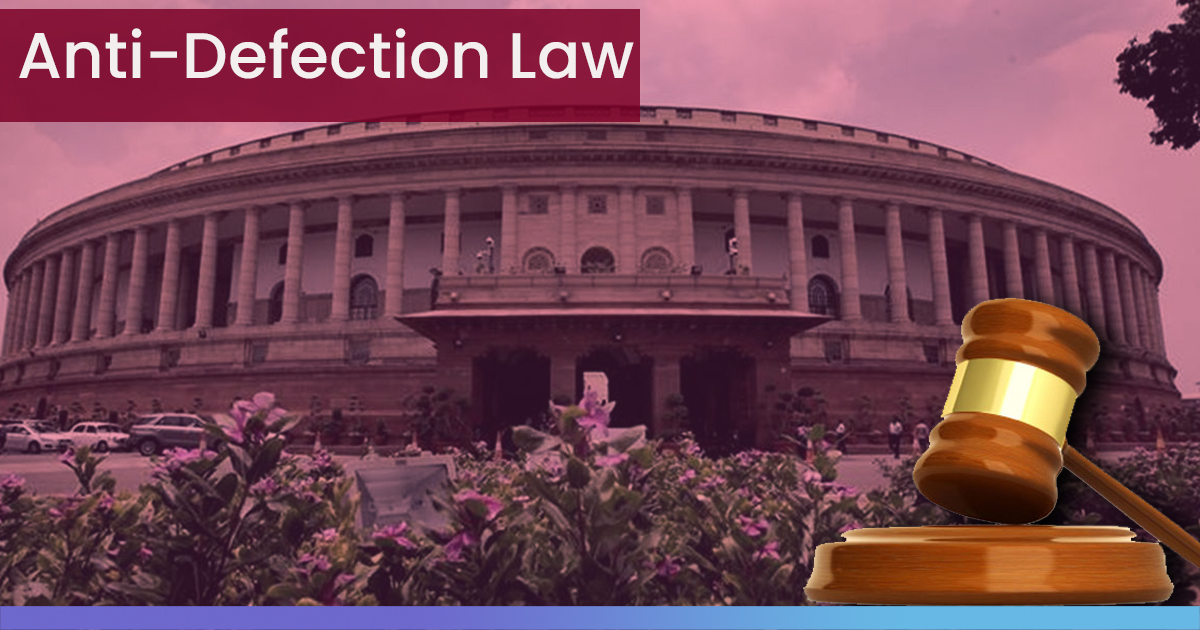12 of the 18 Congress MLAs from Telangana defected to the ruling TRS party and were recognized as members of the ruling party in the assembly after all the 12 members requested the merger of CLP (Congress legislature party) in TRS Legislature Party (TRSLP). This is a misuse of provisions of anti-defection Act. Defections are happening across the country despite a stringent anti-defection act.
The anti-defection law provides for the disqualification of elected members of Legislative house and Parliament. It was introduced in 1985 under the tenth schedule and amended in 2003. According to the Act, elected members of the Legislative house or Parliament would be disqualified if they;
- Voluntarily give up membership of a party
- Vote against the whip issued by political party
On the defection of elected members of their party, the whip can send a petition on the alleged defection to the Chairman or the Speaker of a House for their disqualification and the decision of the Speaker/Chairman is final. There are few exceptions to the disqualifications under anti-defection Act. If at least two third members of a house belonging to one party defect to other party, it would be considered as a merger of the former party in the latter. In such a case, members of the house wouldn’t be disqualified.
The anti-defection Act was introduced to prevent the defection of elected representatives which is not only morally wrong but was leading to unstable governments and was against the mandate given by the voters. There was a time when Gaya Lal, a member of the Legislative Assembly from Haryana changed party thrice in a fortnight in 1967. This lead to the birth of the phrase “Aaya Ram Gaya Ram”. The “Aaya Ram Gaya Ram” culture was expected to be eliminated by the introduction of anti-defection law, but a new trend has now emerged in defections which are not only against the spirit of the anti-defection Act but the democracy at large.
No Equality before Law/Making a mockery of Democracy
Wresting the power of disqualification in the hands of speaker/chairman only helps in preventing defections from the ruling side to the opposition camp and not the other way. For example, in Andhra Pradesh 23 legislators defected from YSRCP to TDP during the term 2014-2019, but none of them were disqualified. 26 MLAs defected from opposition parties to the ruling TRS party in Telangana during the term 2014-2018 with impunity.
What compounds the mockery of democracy is the fact that several defectors were made ministers in both the Telugu states during the previous assembly. In the recently held assembly elections in Telangana, Congress won 19 MLA seats but PCC chief Uttam Kumar Reddy got elected as MP in the recent elections and hence the MLA seat fell vacant. Using this opportunity, TRS government merged CLP in TRSLP. The 12 defections didn’t happen at once. Defections have been happening since January and multiple petitions by the congress party to disqualify the defected MLAs have only been neglected by the speaker.
On the other hand, 3 MLCs who have shifted their loyalties to Congress from TRS have been disqualified in January this year but the MLCs who defected from other parties to TRS were not disqualified. Another issue with the anti-defection Act is that no court can interfere with the proceedings on disqualification of a member of the house. This primary reason why opposition parties aren’t able to get the Act implemented in letter and spirit. The selective implementation of the anti-defection Act is not only against the sprit of democracy but also the constitution.
Need to relook Anti-Defection Act
There is a need to relook at the anti-defection Act and the following reforms can be brought in-
- A time limit of one/two months should be given to the speaker to decide on the disqualifications and the decision of the speaker should be subject to judicial review. Alternatively, decisions under the Tenth Schedule could be made by the President/ Governor on the binding advice of the Election Commission. This will help in protecting the integrity of the office of the speaker.
- Legislators need more freedom in expressing their views with respect to the bills introduced in the house. Disqualification on the grounds of voting against whip issued by a political party should only be applied to the cases where governments stability is under question – money bills and confidence votes. In all other cases, the members of the house should be exempted from disqualification under the anti-defection Act. This will encourage a healthy debate on policy issues and will not ‘unduly impinge’ on the freedom of speech of members.
- The merging of Legislative Party/Parliamentary Party despite the political party being a major force at various levels in the government, doesn’t make sense. In the case of Telangana, a National Party was merged in a regional party! Apart from strength of the political party in that particular house, other factors like the number of members from the political party in other houses, representation of the particular party in various local bodies could also be considered. Merging a legislative party when it has a good number of parliamentarians, members in the other legislative house, elected representatives in the local bodies goes, against democratic principles. This would hit the morale of the political party and the voters.
The Telangana High court served notices to the speaker of the legislative assembly for accepting the merger. The courts should interfere in the particular case and set a precedent against any further misuse of anti-defection Act.
The author is the CMD of Panchajanya Strategies, a political consultancy based in Hyderabad. He is an alumnus of IIM Rohtak.
Also Read: Telangana: Congress’s Fate Hangs In Balance After 12 Out Of 19 MLAs Join TRS












